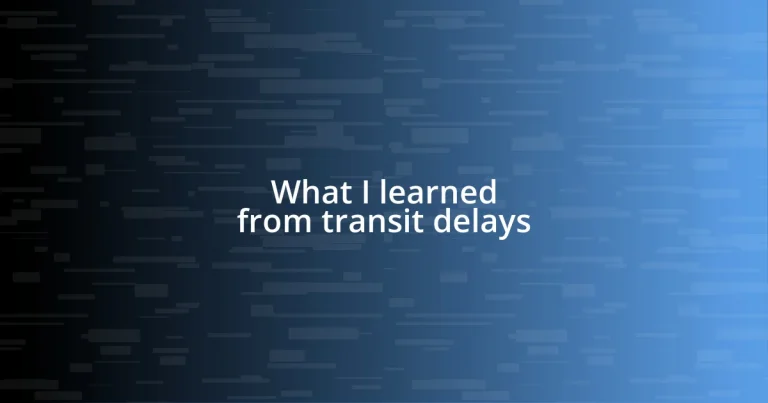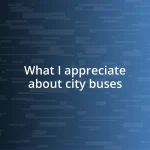Key takeaways:
- Understanding transit delays can lead to emotional resilience, as recognizing their causes helps mitigate frustration.
- Delays provide opportunities for connection, mindfulness, and reflection, allowing individuals to discover new perspectives and enhance personal growth.
- Utilizing distractions, engaging with others, and cultivating a positive mindset during delays can transform them into productive and enjoyable experiences.
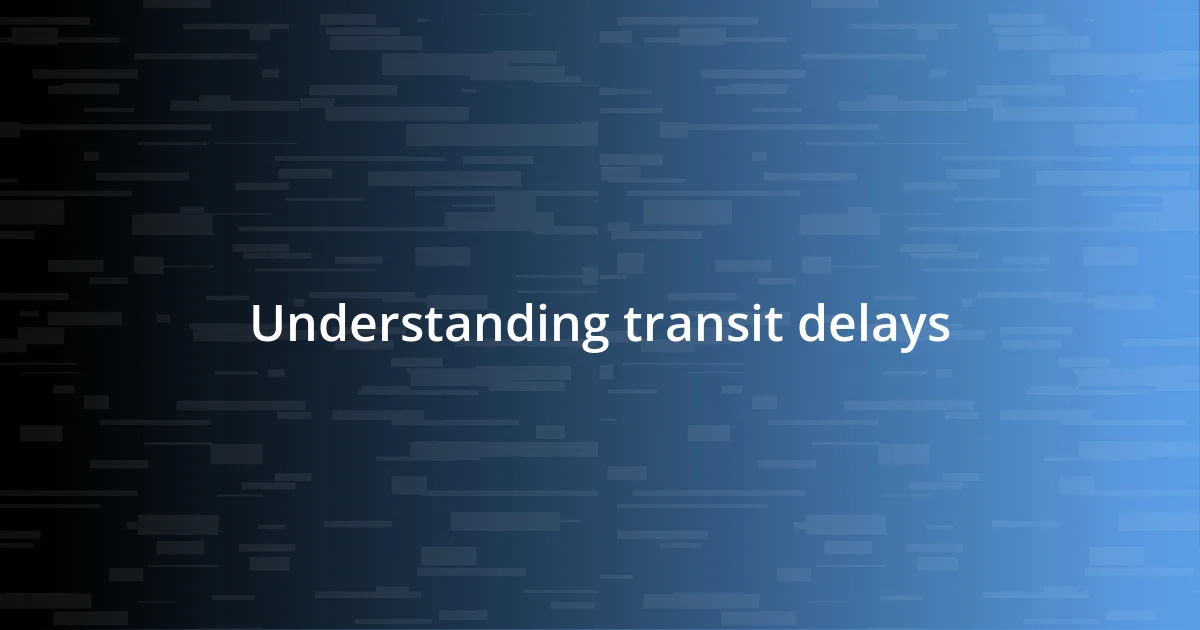
Understanding transit delays
Transit delays can often feel frustrating and unpredictable, but understanding what causes them can help put things in perspective. I vividly remember a rainy Thursday when an unexpected outage hit the subway I rely on daily. Standing on the platform, I observed the mix of annoyance and resignation on the faces around me. It made me wonder: how often do we let external factors control our emotions?
Sometimes, delays stem from simple issues like equipment malfunctions or traffic congestion, while other times they result from broader systemic issues like budget cuts affecting maintenance. I recall one particularly long wait where a friendly bus driver shared how understaffing often leads to a domino effect of increasing delays. It was an eye-opener and made me appreciate their efforts amidst the chaos. Isn’t it interesting how understanding the context can ease our initial irritation?
With the rise of real-time tracking apps, I felt a sense of relief when I could see exactly how delayed my bus was. It’s an empowering tool, but it also made me reflect—does knowing the wait time make the delay easier to bear, or does it just intensify our impatience? Personally, I’ve found that approach—embracing the delay as an unplanned opportunity to pause and breathe—can transform a frustrating situation into a moment of mindfulness.
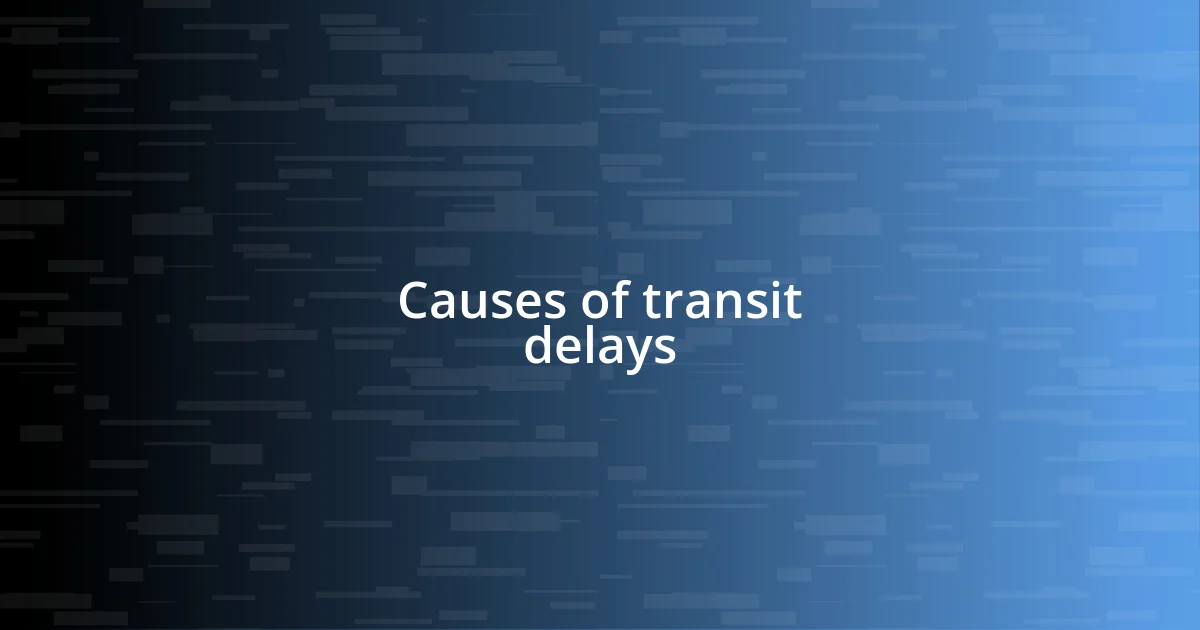
Causes of transit delays
Transit delays can occur for a variety of reasons, and it often feels like a perfect storm of factors coming together. One common cause is weather conditions, like heavy rains or snow, which can significantly impact safety and lead to slower travel speeds. I remember one winter morning when a sudden snowstorm turned my usual commute into an hour-long ordeal. Observing how the streets transformed into a slushy mess, I couldn’t help but think about the drivers navigating those treacherous roads—delays were unavoidable.
Another contributing factor is infrastructure issues, such as aging equipment or construction work. I once found myself stuck on a train during a lengthy maintenance shutdown, and it struck me how important routine maintenance is for smooth operation. I could hear the conductor explaining the situation over the intercom, emphasizing that such maintenance is crucial for safety, yet it doesn’t always fit neatly into a schedule. This experience reminded me that, even though these delays were inconvenient, they often stemmed from necessary precautions.
Lastly, events, whether local or national, can disrupt transit schedules. I recall a crowded train ride during a major festival in the city; the excitement in the air was almost palpable, but it wreaked havoc on our usual timetable. While I loved the festivities, I realized that sometimes, the very things we look forward to can complicate our daily routines. It made me think—how often do we find ourselves balancing our desires with the realities of everyday life?
| Cause of Delay | Example or Explanation |
|---|---|
| Weather Conditions | Heavy rains or snow affecting travel speeds and safety |
| Infrastructure Issues | Aging equipment or construction work reducing efficiency |
| Special Events | Local festivals or events causing increased traffic and crowds |
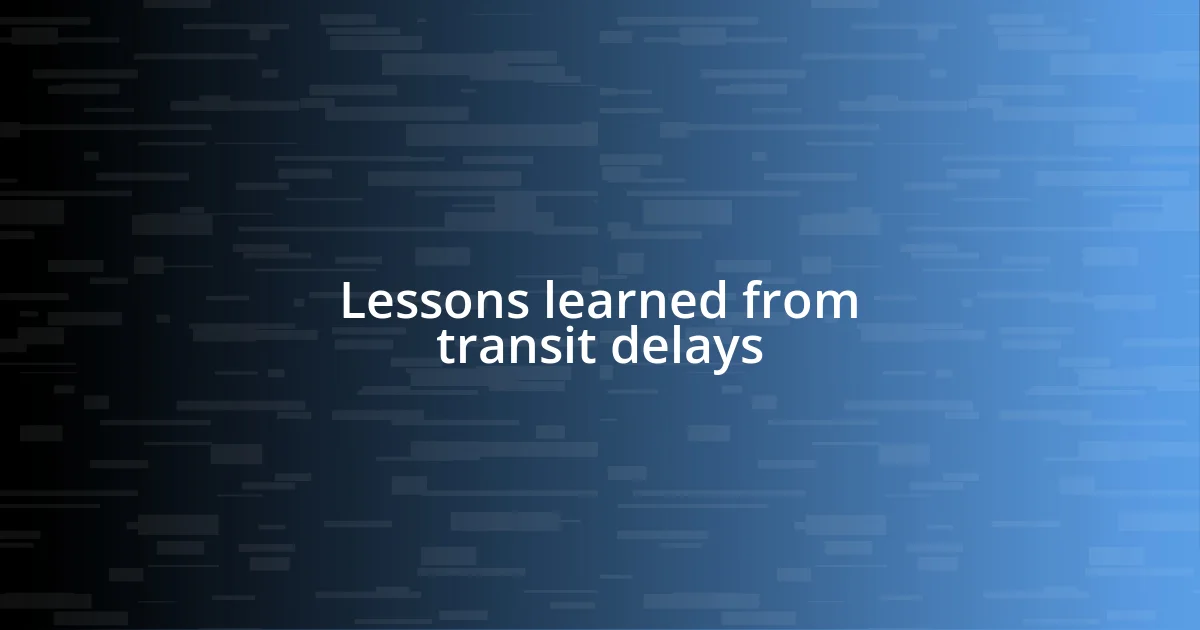
Lessons learned from transit delays
When I think back on those unexpected moments of waiting during transit delays, I realize they offer lessons that go beyond just the inconvenience. For instance, one time, I was left stuck in traffic for nearly an hour, catching snippets of conversations from fellow passengers. It struck me how these shared experiences can foster connection, even among strangers. There’s something profoundly human about collectively enduring a delay, isn’t there?
Here’s what I’ve learned from those moments:
- Emotional Resilience: I’ve discovered that shifting my mindset to see delays as opportunities for reflection or connection can reduce frustration.
- Patience in Practice: Waiting has taught me that practicing patience in small moments can build resilience in larger life challenges.
- Mindfulness Moments: I’ve found that delays encourage me to look around and appreciate my surroundings, turning idle time into a moment of mindfulness.
In another instance, while waiting for a local train that seemed to take forever, I struck up a conversation with an older gentleman about our shared love for books. It reminded me that, amid our busy lives, we often overlook the richness of relationships waiting to be formed. In those moments of delay, we can cultivate empathy, patience, and even inspiration, reminding ourselves that life is often about how we respond to the unexpected.

Strategies to cope with delays
When faced with delays, I’ve found that keeping a collection of good distractions can really help to make the time seem less daunting. The last time I was stuck on a bus for over 40 minutes, I pulled out my phone and dove into a podcast that I had been meaning to catch up on. It was amazing how quickly the time flew by when I was absorbed in an engaging story. Have you ever noticed how a favorite song or an interesting article can transform your wait into an enjoyable moment?
Moreover, practicing deep breathing or a few simple stretches can be a game changer. I remember waiting for a train that was running late and feeling the tension build in my shoulders. I decided to take a moment to breathe deeply and stretch, and it instantly shifted my mood. It’s fascinating how something so simple can ground us and turn frustration into a manageable moment. Have you thought about how your body reacts to stress? It can really change your outlook.
I also suggest using delays as a time to plan or reflect. The other day, while I was caught in traffic, I jotted down a to-do list for the week ahead. It transformed what could have been an annoying wait into a productive session. I often think, why not turn that seemingly wasted time into an opportunity for self-improvement? It’s all about how we approach these pauses in our day.
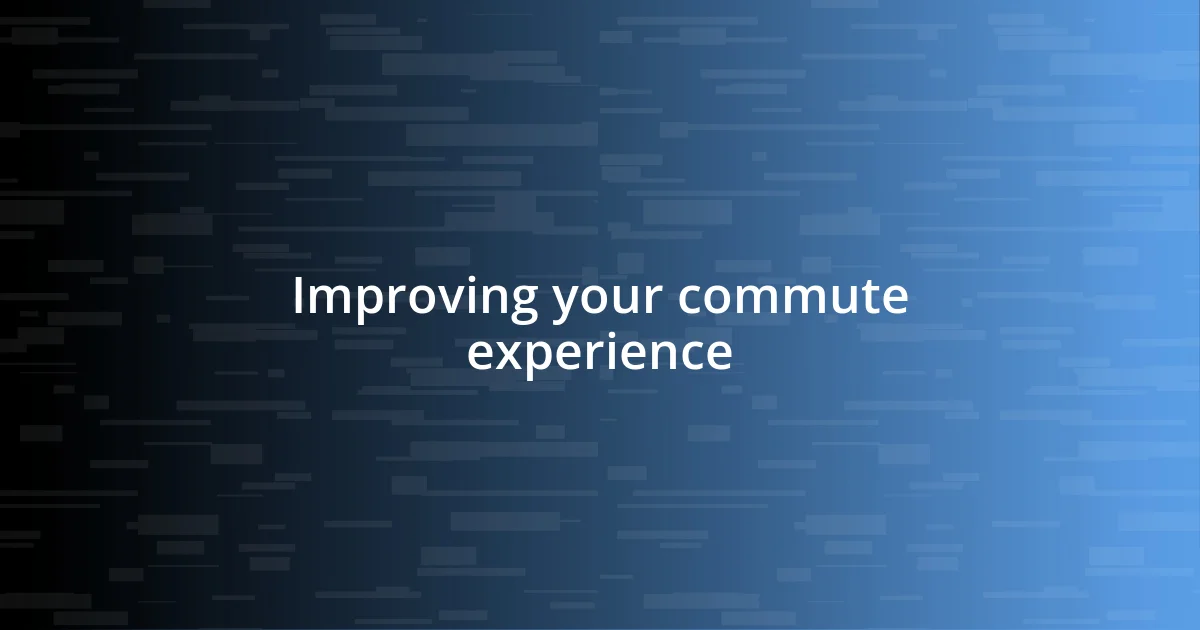
Improving your commute experience
Every commute can unexpectedly turn into an opportunity for self-discovery. A friend of mine once shared how getting stuck on his bus led him to connect with a fellow commuter over their shared interest in travel. I often wonder how many conversations we miss because we’re too engrossed in our phones or simply lost in our thoughts. Engaging with those around us can turn a frustrating delay into a delightful encounter, wouldn’t you agree?
Another approach I’ve found helpful is to curate a personal playlist for those inevitable wait times. On one particularly long train delay, I put my headphones in and listened to uplifting music that instantly transformed my mood. It’s incredible how a good song can sweep you away from the dull ache of waiting and propel you into a more positive mindset. Have you ever experienced that surge of energy that comes from a powerful lyric or a catchy beat?
Lastly, I’ve started carrying a small journal with me during my commutes. Recently, while waiting for a bus that seemed perpetually late, I began jotting down my thoughts about the day ahead. It was surprising how much clarity emerged from those moments of quiet introspection, converting what could have been mere frustration into a session of meaningful reflection. How often do we allow ourselves that time to pause and listen to our own minds? By embracing the unexpected pauses in our routine, we can enrich our lives in profound ways.
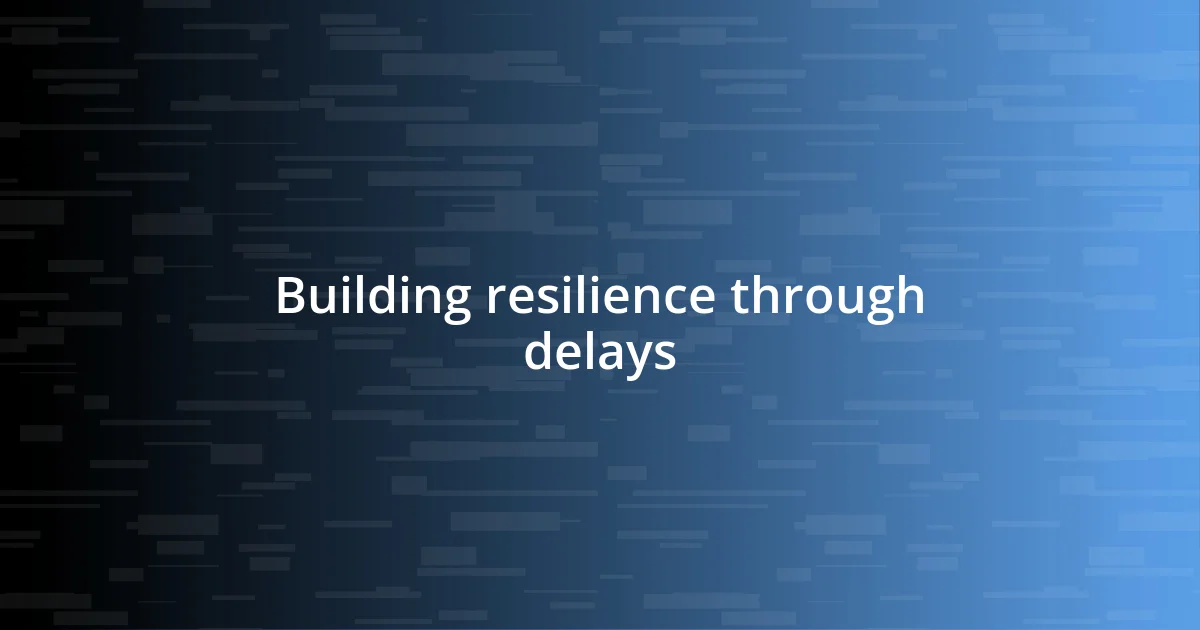
Building resilience through delays
Building resilience through delays can profoundly reshape our outlook on life. I recall one particularly grueling delay on a train after a long day at work. Instead of letting frustration take over, I used that time to reflect on my week and reset my priorities. Have you ever thought how a moment of pause can give you clarity? It’s strange, but I found that delay turned into a mini-strategy session for my personal goals.
There are times when delays feel like a personal test of patience. Just last month, I was stuck in traffic, simmering with irritation until I decided to tune into an audiobook. Suddenly, the wait became an engaging narrative experience. It made me ponder how we often overlook opportunities to transform frustration into enjoyment, don’t you think? It’s an incredible reminder that resilience isn’t just about enduring hardship; it’s about enhancing our experience within it.
Every delay, I’ve realized, contains a tiny challenge that can teach us something. During a long flight delay, I overheard a family chatting about their favorite travel destinations. Inspired, I joined in, sharing my thoughts, and we ended up exchanging travel tips and laughter. It’s moments like these that underscore the importance of connection and adaptability—proving that even in the most inconvenient situations, there’s potential for building bonds and learning new perspectives. Isn’t it amazing how a simple conversation can shift the entire tone of a waiting period?












